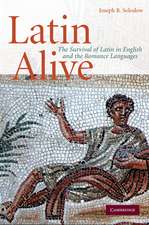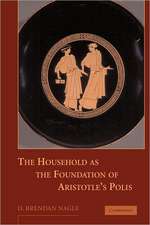Greek Laughter: A Study of Cultural Psychology from Homer to Early Christianity
Autor Stephen Halliwellen Limba Engleză Paperback – oct 2008
| Toate formatele și edițiile | Preț | Express |
|---|---|---|
| Paperback (1) | 360.15 lei 6-8 săpt. | |
| Cambridge University Press – oct 2008 | 360.15 lei 6-8 săpt. | |
| Hardback (1) | 907.28 lei 6-8 săpt. | |
| Cambridge University Press – oct 2008 | 907.28 lei 6-8 săpt. |
Preț: 360.15 lei
Nou
Puncte Express: 540
Preț estimativ în valută:
68.91€ • 72.15$ • 57.02£
68.91€ • 72.15$ • 57.02£
Carte tipărită la comandă
Livrare economică 05-19 aprilie
Preluare comenzi: 021 569.72.76
Specificații
ISBN-13: 9780521717748
ISBN-10: 0521717744
Pagini: 632
Dimensiuni: 151 x 228 x 35 mm
Greutate: 0.98 kg
Ediția:1
Editura: Cambridge University Press
Colecția Cambridge University Press
Locul publicării:Cambridge, United Kingdom
ISBN-10: 0521717744
Pagini: 632
Dimensiuni: 151 x 228 x 35 mm
Greutate: 0.98 kg
Ediția:1
Editura: Cambridge University Press
Colecția Cambridge University Press
Locul publicării:Cambridge, United Kingdom
Cuprins
1. Introduction; 2. Inside and outside morality: the laughter of Homeric gods and men; 3. Sympotic elation and resistance to death; 4. Ritual laughter and the renewal of life; 5. Aischrology, shame and Old Comedy; 6. Greek philosophy and the ethics of ridicule; 7. Greek laughter and the problem of the absurd; 8. The intermittencies of laughter in Menander's social world; 9. Lucian and the laughter of life and death; 10. Laughter denied, laughter deferred: the antigelastic tendencies of early Christianity; Appendix 1. The Greek (body) language of laughter and smiles; Appendix 2. Gelastic faces in visual art.
Recenzii
'… a wide survey of Greek laughter from Homer to the early Christians … the introduction is quite the best brief overview of the role of laughter in any historical period that I have ever read … some of [Halliwell's] discussions are brilliant … The highlight is his discussion of Democritus, the fifth-century philosopher and atomist …' Mary Beard, The Times Literary Supplement
'… a book of great originality as well as immense range … it is remarkable how a chronological treatment also has a compelling thematic momentum: this is an exhilarating read.' Anglo-Hellenic Review
'Stephen Halliwell has written a monumental book on the notoriously volatile and elusive phenomenon of laughter. This book is an extraordinary resource. The trouble with laughter - and the delight of it - is that it impinges on practically every socio-cultural dynamic imaginable. Halliwell has given us a rich and remarkable starting point for thinking about such dynamics. That is why every student of the ancient world should attend this book.' Bryn Mawr Classical Review
'… a book of great originality as well as immense range … it is remarkable how a chronological treatment also has a compelling thematic momentum: this is an exhilarating read.' Anglo-Hellenic Review
'Stephen Halliwell has written a monumental book on the notoriously volatile and elusive phenomenon of laughter. This book is an extraordinary resource. The trouble with laughter - and the delight of it - is that it impinges on practically every socio-cultural dynamic imaginable. Halliwell has given us a rich and remarkable starting point for thinking about such dynamics. That is why every student of the ancient world should attend this book.' Bryn Mawr Classical Review
Notă biografică
Descriere
This book shows how the theme of laughter can shed light on ancient Greek ethical values and attitudes to life.














